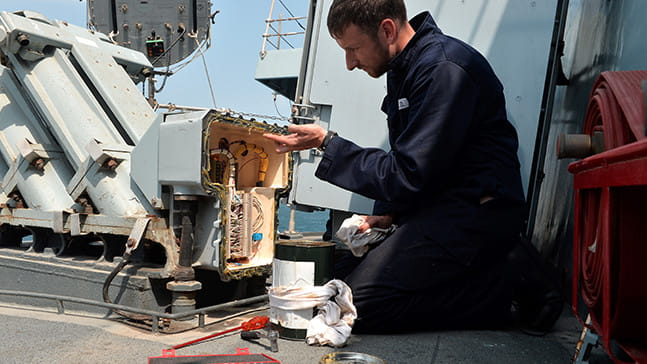Accelerated Apprentice Scheme (Weapon Engineering)
You’ll be fast-tracked to working with our cutting-edge kit, part of the team that guarantees our weapons systems are world-class.
- £37,500 - £58,000
- A-Levels / college qualifications
- Surface Fleet
- Engineering
- Rating level
£37,711
Merit
Register
£58,000
Study
6 weeks

By joining the Royal Navy on an Advanced Apprenticeship, I was able to progress really quickly and use the qualifications I already had. It wasn’t long before I was taking responsibility for some amazing kit.
Role details
What you’ll do
Joining the Royal Navy on the Accelerated Apprentice Scheme (Weapon Engineering) means supercharging your training and development within one of our most elite teams. You’ll have real responsibility from day one, getting your hands on some of the most advanced kit on the planet, and guaranteeing your warship’s performance.
Unlike comparable civilian roles, you’ll quickly find yourself in charge of some of the most sophisticated electronic equipment in existence, as you join as a Probationary Leading Hand – two ranks higher than most Engineering Technicians.
Your role
- Take responsibility for the safety of your crewmates, whether that’s identifying a potential threat, or ensuring your ship can defend itself.
- Maintain and operate complex communication, sensor and weapon systems, guaranteeing missiles, guns and anti-submarine torpedoes are fully operational.
- Get your hands on some of the most sophisticated electronic equipment in existence, working with your team, and under the guidance of the Weapon Engineer Officer.
- Complete daily rounds, checking equipment to ensure the ship remains operational, and finding innovative solutions when there’s a problem.
Pay & benefits
- A starting salary of £37,711, rising to £58,000 as your career progresses
- An excellent non-contributory pension scheme – we pay into it for you, so you don’t have to sacrifice any salary
- Six weeks of paid holiday every year
- Free medical and dental care
- Additional pay for each day spent at sea
- Amazing opportunities, including world travel and adventurous training for two weeks every year
- Free gym and sports, from football to kayaking to kite-surfing
- Subsidised travel, accommodation and food
Skills for life
Qualifications you'll gain
- An Advanced Apprenticeship (Level 3) Engineering Manufacturing
Opportunities you'll gain
- You could work towards a degree like Electronic Engineering
Skills you'll develop
- Learn to maintain and operate some of the most cutting-edge kit on the planet.
- Develop your natural aptitude for fixing things by working on advanced electronic and mechanical systems.
Eligibility
- You need to be aged 17 to 25
- A minimum of three GCSEs (or equivalent) at grade 4 or above including English Language, Mathematics and at least one science
- You must be a United Kingdom citizen or British Dual National. Dual Nationality restrictions do apply
- You must have lived in the UK for 5 years continuously prior to application
- A Body Mass Index (BMI) between 18 and 28 (between 17 and 27 if under 18)
There are two options for acceptable qualifications required in addition to the basic academic criteria above:
Option 1
- A National Qualifications Framework Level 3 Diploma (with a minimum of a Merit Pass) in a Engineering discipline
Option 2
- At least 48 UCAS points in A-Levels (or equivalent) in Mathematics and STEM subject (minimum grade D or above in each subject)
Skills & interests
- A quick thinker, with a passion for working with the latest equipment and technology
- A problem-solver who can work well as part of a team
- A real sense of adventure, with a high level of physical and mental fitness
- Enthusiasm for fixing and maintaining electronic and mechanical system
Joining process
From picking your role to starting on your first day, these are the steps you'll take to join as a rating.
Submit an application
Defence Aptitude Assessment (DAA)
You’ll be tested on: Verbal Reasoning, Numerical Reasoning, Work Rate, Spatial Reasoning, Electrical Comprehension and Mechanical Comprehension.
To prepare, you can practise the DAA
Interview
Candidate Preparation Course (CPC)
Start training
Got a question?
Our virtual recruiter is available to answer your questions 24 hours a day
